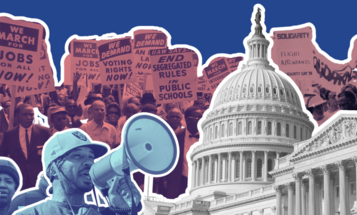
How the Loper Bright Case Could Weaken Our Democracy
Our environment, healthcare, and labor protections are in the far-right's crosshairs

Recently, the Supreme Court heard oral arguments for two cases with potentially devastating impacts on federal agency power to enact regulations that protect workers, consumers, the environment, and more. At issue in Loper Bright Enterprises v. Raimondo and Relentless, Inc. v. Department of Commerce is a 40-year-old legal doctrine called Chevron deference, which requires courts to defer to expert agency interpretations of federal law. The stakes are high as the Court’s decision could weaken robust regulations that protect and provide for our communities.
Regulations that prevent pollution, enforce labor laws, administer Medicare and Medicaid, and more could be in the far-right's crosshairs.
During oral arguments, the six ultraconservative Justices expressed willingness to overturn, or significantly narrow, Chevron deference. If this scenario plays out, it could unleash regulatory chaos as corporations and other stakeholders jump to try to overturn regulations through the courts. Regulations that prevent pollution, enforce labor laws, administer Medicare and Medicaid, and more could be in the far-right's crosshairs. Without Chevron, agency regulations may be subject to a judge’s political whims—a clear breach in the system of checks and balances. The least democratic branch of the federal government—the branch that in Justice Ketanji Brown Jackson’s own words is “not accountable to the people”—would be able to sidestep both Congress and agencies to enact its own policy preferences.
Loper Bright and Relentless are just one part of this power grab. As we previously outlined, the push to overturn Chevron comes on the heels of the Supreme Court’s increasing reliance on the “major questions doctrine,” which it used to strike down the Centers for Disease Control and Prevention (CDC)’s eviction moratorium; slash an Environmental Protection Agency (EPA) regulation protecting wetlands; and overturn President Biden’s student loan forgiveness program. Further, the Supreme Court’s efforts to overturn Chevron cannot be divorced from the far-right takeover of the courts. New Civil Liberties Alliance, the organization behind the Relentless case, is backed by Leonard Leo and the Charles Koch Foundation. In addition, many industry groups that favor deregulation, including the gun lobby and anti-labor groups, submitted amicus briefs supporting overturning Chevron.
These attacks are an outgrowth of a decades-long strategy spearheaded by corporate interests and funded by the conservative movement struggling to retain economic and political power.
These attacks are an outgrowth of a decades-long strategy spearheaded by corporate interests and funded by the conservative movement struggling to retain economic and political power. In 1971, the U.S. Chamber of Commerce commissioned the Powell Memo, a document outlining how businesses could “reassert corporate hegemony” in American politics. Under the guise of protecting the “free enterprise” system, the Powell Memo was a direct response to the expansion of civil and worker rights. The conservative movement and its megadonors implemented the recommendations on judicial and legal strategy, leading to the creation of the Federalist Society, a network of conservative litigation groups and think tanks and a decades-long movement to pack the federal judiciary with ultraconservative ideologues handpicked to deliver for corporate interests.
And while Loper Bright is the most far-reaching, several other cases this term could also weaken agency authority to issue regulations that protect the public. For example, the Consumer Financial Protection Bureau (CFPB)'s ability to continue functioning as an independent agency is at stake in CFPB v. Community Financial Services Association of America, Limited (CFSA). If the Supreme Court upholds the ultraconservative Fifth Circuit’s ruling that CFPB’s independent funding structure is unconstitutional, it will throw into question the hundreds of rules and regulations the agency has created to protect consumers from abusive or unfair practices by banks, lenders, and other financial institutions.
The Supreme Court is poised to, at the very least, significantly narrow Chevron and hand yet another victory to corporate interests.
The Supreme Court is poised to, at the very least, significantly narrow Chevron and hand yet another victory to corporate interests. Congress can rein in this out-of-control Court by imposing a binding code of ethics and passing legislation that expands the Court, such as the Judiciary Act. These measures would put us down the path to undoing the damage caused by cases like Loper Bright and Relentless and stop the far-right takeover of the courts. Congress must not allow corporations and the wealthy elite to hijack our democracy and economy any longer.



